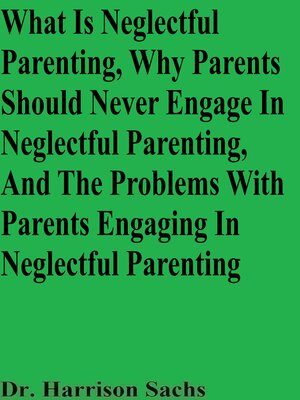What Is Neglectful Parenting, Why Parents Should Never Engage In Neglectful Parenting, and the Problems With Parents Engaging In Neglectful Parenting
audiobook (Unabridged)
By Dr. Harrison Sachs

Sign up to save your library
With an OverDrive account, you can save your favorite libraries for at-a-glance information about availability. Find out more about OverDrive accounts.
Find this title in Libby, the library reading app by OverDrive.



Search for a digital library with this title
Title found at these libraries:
| Library Name | Distance |
|---|---|
| Loading... |
This audiobook is narrated by a digital voice.
This essay sheds light on what is neglectful parenting, demystifies why parents should never engage in neglectful parenting, and expounds upon the problems with parents engaging in neglectful parenting. Neglecting parenting is the antithesis of diligent parenting. Neglecting parenting is an egregiously abysmal type of parenting style in which a parent implements decisions that are in worst interests of his children. Parents should always abstain from implementing decisions that are in the worst interests of their children. Parents should strive to implement decisions that are in the best interests of their children. Parents should not be apathetic to the well-being of their children. Parents should be concerned about the well-being of their children. It can be inferred that certain parents are apathetic to the well-being of their children in contexts in which they opt to implement decisions that are in the worst interests of their children when they are acutely aware of the unfavorable foreseeable effects that these injudicious decisions can elicit. Parents should take heed of the evidence-based research findings of decision outcomes prior to the advent of implementing decisions that impact their children. By ascertaining the evidence-based research findings of decision outcomes parents can be at a higher probability to implement decisions that not in the worst interests of their children. Parents are not limited to discovering the evidence-based research findings of decision outcomes that can help them to guide their decision-making. Parents can also meticulously conduct cost-benefit analyses and opportunity cost analyses that can not only guide their decision-making, but that can also help them to ascertain the classifications of certain decisions. A decision can be classified as a prudent decision or imprudent decision based on its foreseeable effect. Implementing an imprudent decision has a high probability to elicit an unfavorable foreseeable effect.







